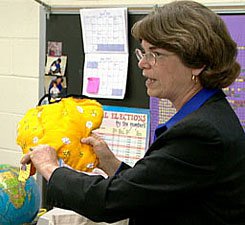Project-Based Learning Professional Development Guide
An overview of the Edutopia professional development guide for teaching how to use project-based learning in the classroom.
Edutopia.org's project-based learning professional development guide can be used for a two- to three-hour session, or expanded for a one- to two-day workshop, and is divided into two parts.
Part one is a guided process, designed to give participants a brief introduction to project-based learning (PBL), and answers the questions Why is PBL important?, What is PBL about?, and How does PBL work?
Part two assigns readings and activities for experiential PBL. Ideally, the tasks will be accomplished using group collaboration and with the use of technology. These activities are outlined in the Workshop Activities section. You will also find links to examples, from the Edutopia.org video library, of PBL in action at the elementary, middle, and high school levels.

The Resources for PBL page includes recommended websites, books, and additional videos to learn more about PBL.
This guide was designed to address many of the National Educational Technology Standards (NETS), established by the International Society for Technology in Education (ISTE).
To find the specific standards for your state, visit this page at Education World that lists standards by academic subject and by state.
Continue to the next section of the guide, Why Is PBL Important?
Acknowledgments: This module was written by Sara Armstrong and Marian Shaffner. The George Lucas Educational Foundation extends its thanks to the following people who reviewed it for content and usability: Peggy Benton, assistant professor, PT3 grant director and adviser, Department of Instructional Technologies, San Francisco State University, San Francisco; DiAnn Ellis, professor, Department of Education, SFSU; David Pownell, assistant professor, Department of Education, Washburn University, Topeka, Kansas; Tina Barrios, supervisor of instructional technology, Manatee County Schools, Bradenton, Florida; Donna Read, associate professor of education, Florida Atlantic University, Boca Raton, Florida; and Bruce "Chip" Daley, coordinator of research, development and special projects, Clark County School District, Las Vegas.
This guide is organized into six sections: